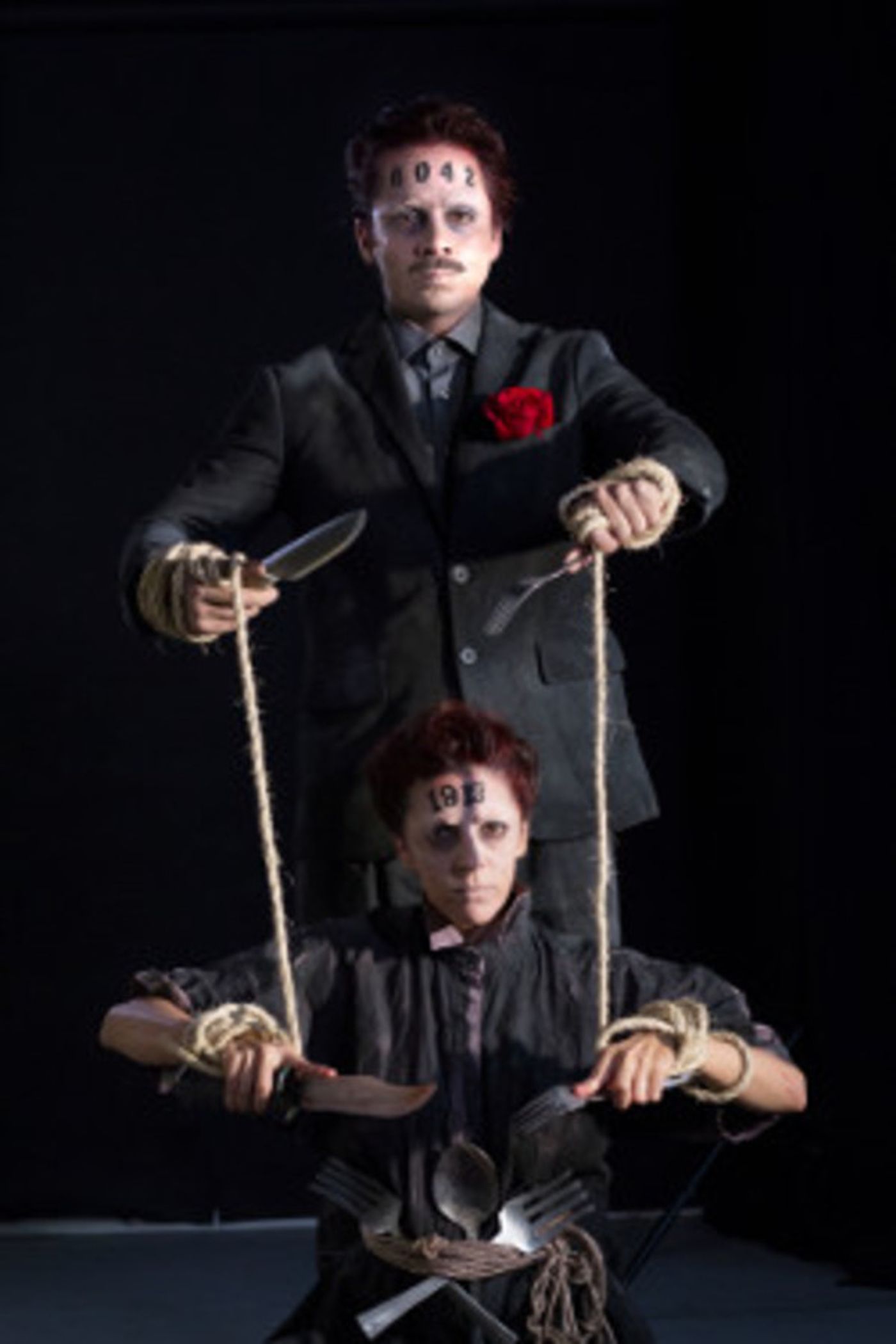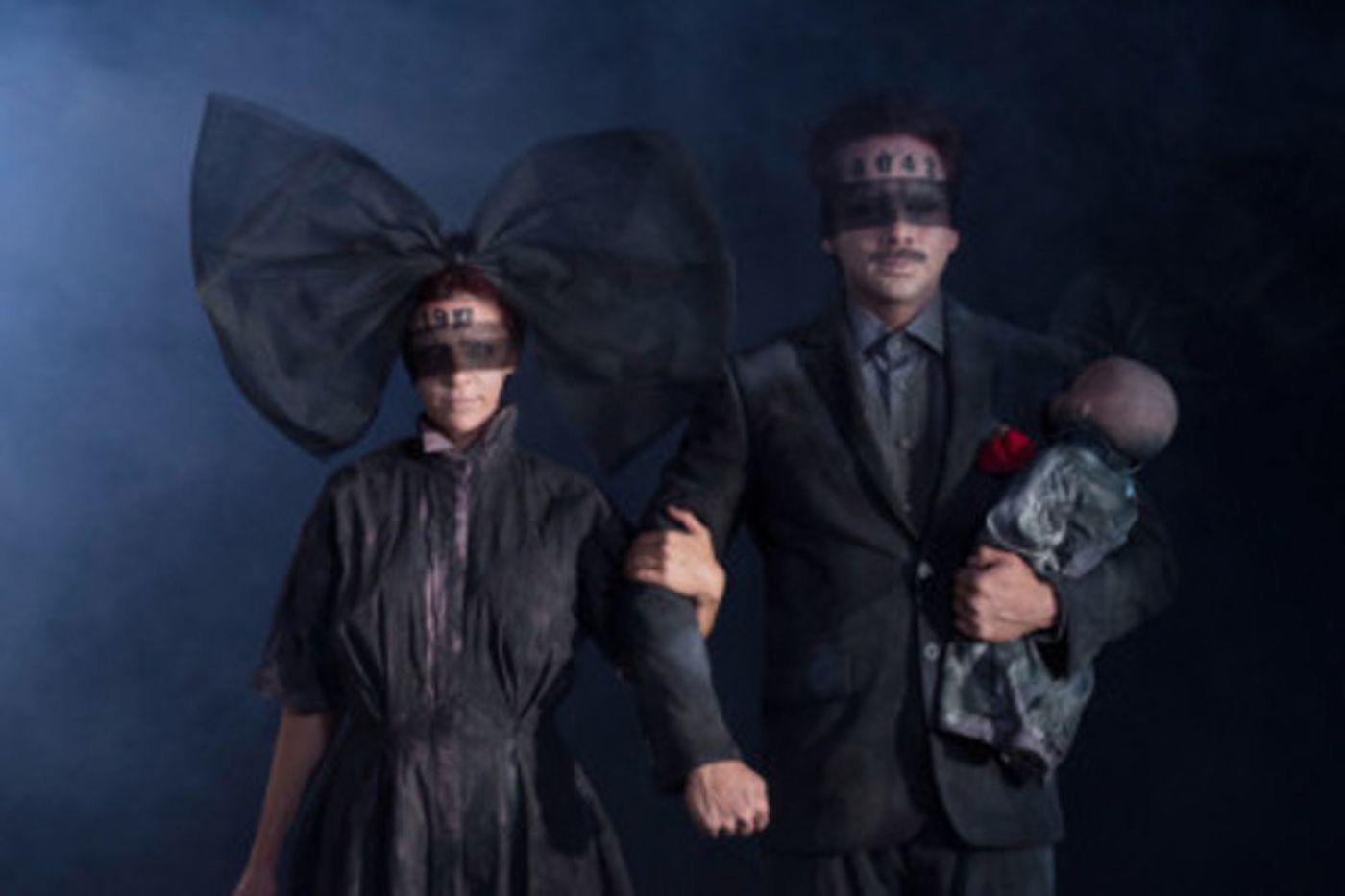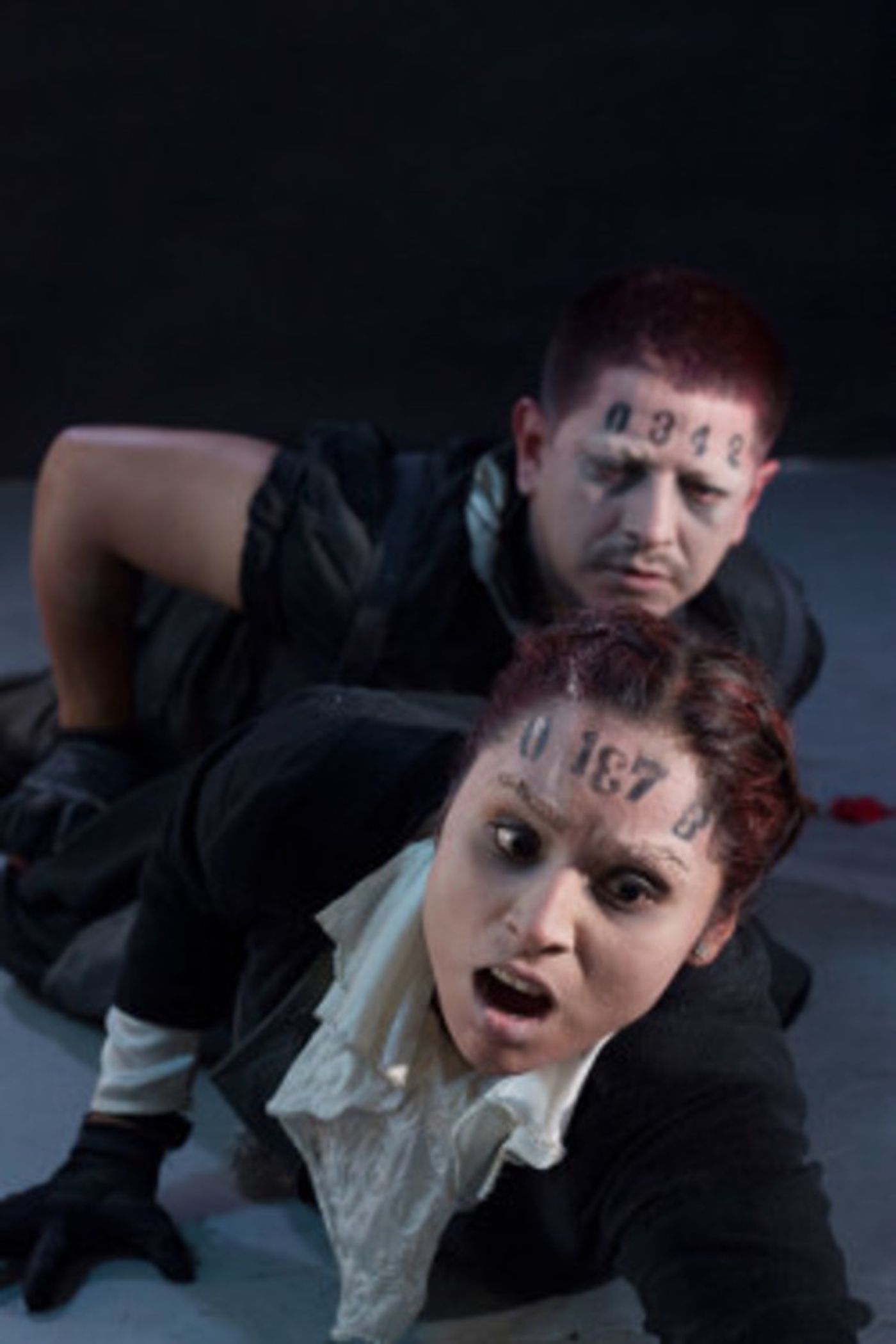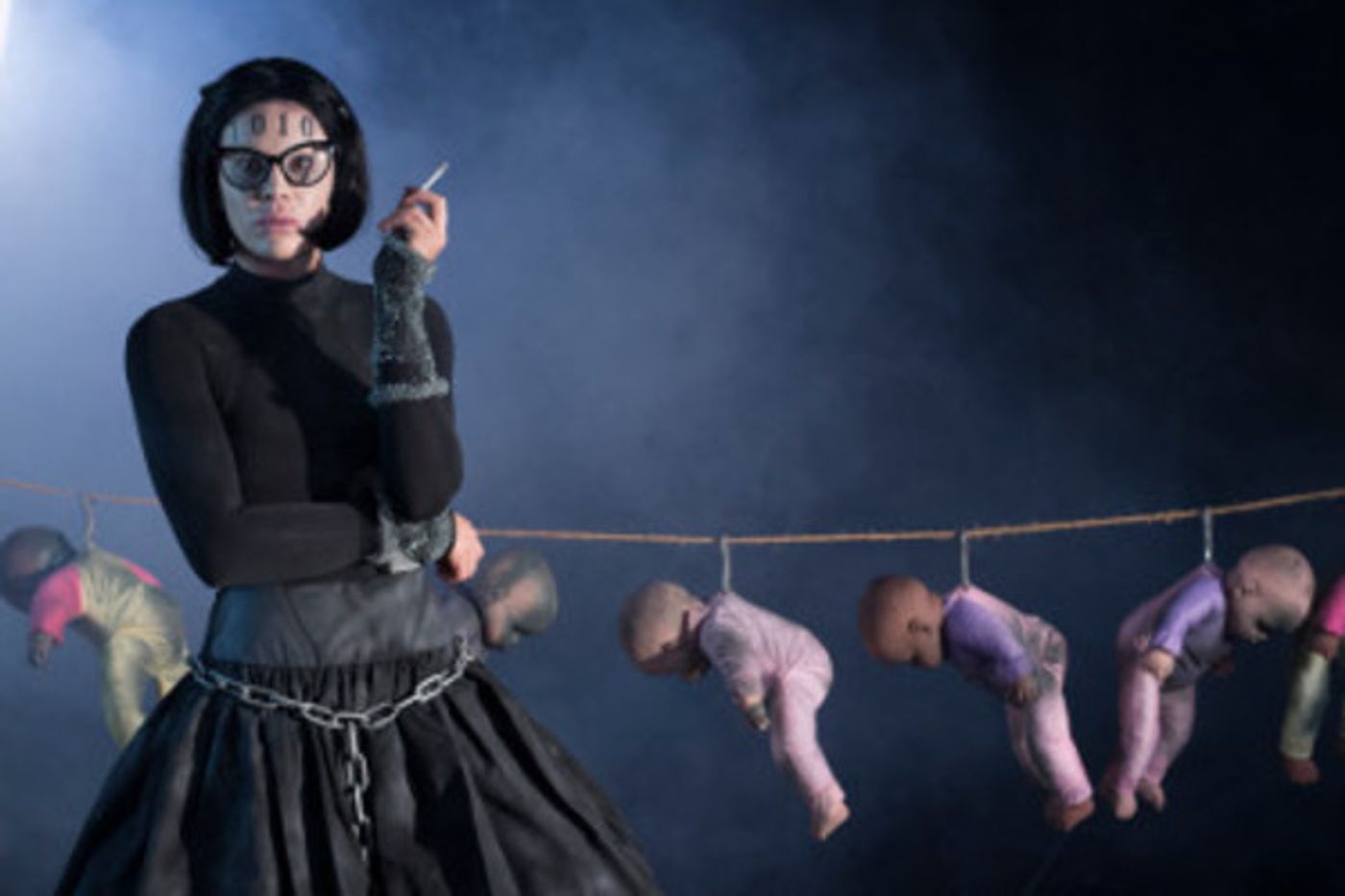Photo Flash: Theater for the New City Presents CITIZENS OF THE GRAY
Theater for the New City Presents "Citizens of the Gray" by Elia Schneider. See photos from the production below!
Playwright/director Elia Schneider--born in Israel, raised in Venezuela and now an American citizen--is known for hauntingly visual productions that transcend language with strong imagery and a dreamlike fresco of movement and design. Her newest work, "Citizens of the Gray or the Dark Thing that Sleeps Inside Me," deals with the war of the sexes in the age of the #MeToo Movement. Hitherto, her theatrical productions have mostly emerged from ideas derived from Kafka. Now she is channeling Strindberg for a new work of ensemble creation with her Teatro Dramma. Theater for the New City will present the world premiere of the piece November 9 to 25. It will be Schneider's Theater for the New City debut.
The play is a choreography of movement and actions. The setting is clean, empty and minimal. Every detail is controlled. The mood is dark, gray and post-apocalyptic. Women fight against men for control and domination. Sometimes, they sacrifice control for care and sometimes the men weaken and seek comfort, but there is no connection between the sexes. Robotically, they pair for sex, which they often use to punish. How can they survive if they exist to destroy each other? It's an image-based piece that you can relate to in many ways, based on your life experience and readings. The intention is not to deliver a single message, but to rattle around the contradictory feelings of its various characters with forceful imagery. Texts are drawn from poets including Sylvia Plath. Music includes tangos by Osvaldo Montes, a renowned Argentine composer, that were written expressly for this production. Lighting is designed by Joseph Novoa, who is also a renowned film maker. There is a cast of ten actors, all of Latin American background, who met ten years ago in Schneider's workshops at Los Angeles' Stella Adler Academy of Acting.
Amidst the gray, apocalyptic imagery of the play, you get to savor a variety of full-blown characters. Schneider cautions, "You don't only see the person, you see the real profound guts of the person." As men and women confront each other, the relationship of victim to victimizer changes constantly in a duet of destruction. At the end they both loose, destroying their souls to the point where they would welcome death. There are parallels to the poetry of Sylvia Plath, whose disappearance was to some a suicide and to others, the beginning of a new cycle.
The piece also contains an aesthetic you might call the beauty of ugliness and a feeling of walking through an inescapable tunnel. Schneider muses, "Once you accept that you can't escape, it's like dancing every moment with a death you have created. That opens you up to the possibility of a new circle, of trying something new--the light at the end of the tunnel. But dying is the inescapable passage to it."
Schneider burst into worldwide recognition in the 1980s with her Caracas-based Teatro Dramma and was "adopted" artistically, by La MaMa's Ellen Stewart, who gave her a New York creative home and regarded her as one of her theater's elite directors. Schneider's previous productions at La MaMa include Franz Xavier Kroetz' "Request Concert" (1982), Franz Kafka's "Blumfeld" (1985), her own play "Gaz" (1989), developed for the 50th Anniversary of the Holocaust, and her own play "Rooms" (2000), which set three women in a Kafka-esque world of isolation and everyday obsessions.
Ms. Schneider emigrated from Israel to Venezuela at age four because her father feared the Jewish State would be a place of continuous wars. So the family moved to Latin America, where the turnover of wars was even faster. "The world is so tragic that you just have to understand that it is absurd," she says, pointing out how the shifting of political realities of Latin America are extremely Kafka-esque. This has been reflected in the concepts of many of her plays. She and her Teatro Dramma relocated from Caracas to Los Angeles in 2011 because the dictatorial regimes of Chavez and Maduro did not allow for freedom of speech or other civil liberties.
The works she has hitherto shared with New York audiences have been widely praised for their gorgeously troubling surrealism. Her 1982 rendition of Kroetz' "Request Concert" at La MaMa divided the play's solo character into two versions of herself played by two different actresses in whiteface. The production was a stark contrast to Joanne Akalitis' photorealistic staging of the play two years before and, to some critics, a superior journey into the play's inner life. The New York Times (Mel Gussow) asserted that, by vindicating the abstract approach to this play, Ms. Schneider had helped establish the work as a classic. "Blumfeld" (1985) earned accolades for Schneider for a "troubling, startling and beautiful meditation on loneliness" (Laurie Stone, Village Voice). Critiques raised provocative issues on how the essence of Kafka's writing could rightfully be adapted for the stage. In an article whose headline called the play "beyond Kafka," Steven Hart (Villager) observed, "Kafka was a master of finding the subtleties that lie beneath the endless banality of most human relations, and these undercurrents are what Teatro Dramma seems to be exploiting in 'Blumfeld.'" He analyzed the play as "an exploration of the atmospheric conditions the story produces in the reader," an approach that could have been taken from the director's notes of Schneider's current play. "Gaz" (1989), a lavish production with surreal images of Nazi concentration camps, was a digression from Schneider's series of works dealing explicitly with Kafka themes and flummoxed critics who had been expecting something more easy to associate with the Czech writer.
When she returned with "Rooms" (2000), a more recognizably Kafka-esque play for three women, it was triumphantly. The wordless piece delivered the sensations of imprisonment and loneliness through the distancing actions we do in everyday life. Three women spent their lives sealed in their rooms, but with jealous eyes and ears alert to every whisper and shadow next door. They moved robotically through household chores that were sometimes mundane and sometimes weird--cleaning a toilet, fixing hair, making coffee, caressing meat, walking a metallic dog. The set, all in gray, boxed by soaring walls of wire mesh, seemed as expressive as technicolor. The New York Times (D.J.R. Bruckner) declared, "An unspeakable sorrow of hopelessness spreads through the theater like the shadow of death's wings. Yet it is such a triumphant moment of theater that it brings cries of admiration and a thunder of hands from the audience....To feel such exhilaration and despair at once is a rare epiphany."
"Judgment on a Gray Beach" (2015), a work on exile and totalitarianism, was Ms. Schneider's first production with the new theater company she formed in Los Angeles after moving permanently to the U.S. in 2011. It was acclaimed for the clarity of its imagery, the pungency of its atmosphere, the precision of its cast and the extremely high caliber of its production values.
Between "Rooms" and "Judgment on a Gray Beach," Schneider directed her own stage adaptations of Ionesco's "The Lesson" (2004) and Mrozek's "The Emigrants" (2010) in Venezuela, but mostly she was directing and producing films.
Ms. Schneider works with her husband, Joseph Novoa, in two production companies, Joel Films and Unity Films, interchanging responsibilities as producer and director. She directed "Huelepega" (Glue Sniffer, 2000), a film about street kids in Caracas that earned the highest box office gross of the year. It won 15 international awards and was the Venezuelan submission to the Academy Awards. Her "Punto y Raya" (Dot and Line, 2005) was a dramatic comedy about an imaginary and absurd war between Venezuela and Colombia in 2004. It was the Venezuelan submission to the Academy Awards and won 30 international prizes. Her "Desautorizados" (Unauthorized, 2010), about a theater writer who lives inside a story he is creating, was nominated for the Golden Globet Award in the International Film Festival of Shanghai. Her "Tamara" (2015) is a film about a Venezuelan lawyer who underwent sex reasignment surgery (SRS). She has produced and cast four films by Novoa and one by her son, Joel Novoa Schneider. She is a part time faculty member of the Stella Adler Academy of Acting in Los Angeles.
For theatrical works, her rehearsal process is like a work in progress that never ends. Starting with basic ideas, the group of artists relies on improvisation and physicality. The assumption is that the actor's body is clear and capable of expressing all the ideas of the play. There is no need for dialogue per se: the metaphor of the images is the main idea, with actions always reflecting the inner thoughts of the characters.
Schneider writes, "I am excited to bring my work for the first time to Theater for the New City, which embraces new work and enables performances in innovative styles to reach receptive audiences at affordable prices. TNC is experimental, community minded and really vibrant. Crystal Field embraced us and opened the door for us. Believing in our work, she is giving us the support and creative freedom to perform again. We are very grateful for her generosity and confidence. She understands human needs and generates change with her actions. She is big in her mind and big in her heart."
Teatro Dramma, founded in 1982 in Venezuela and incorporated here as a 501(c)3 in 2016, operates like a multicultural, multilingual experimental theater lab, fusing various arts (music, movement, acting, dance, poetry, video, lighting, painting, performance, sets, shadows, etc.) into one universal language. It researches different channels of communicating ideas in order to inspire by metaphors of the image.
Photo Credit: Johan Canelo.

Gustavo Ramirez and MariAna Lopez

Gustavo Ramirez and MariAna Lopez

Hector Vera and Siumara Samayoa

Barbara Blanck
Videos

